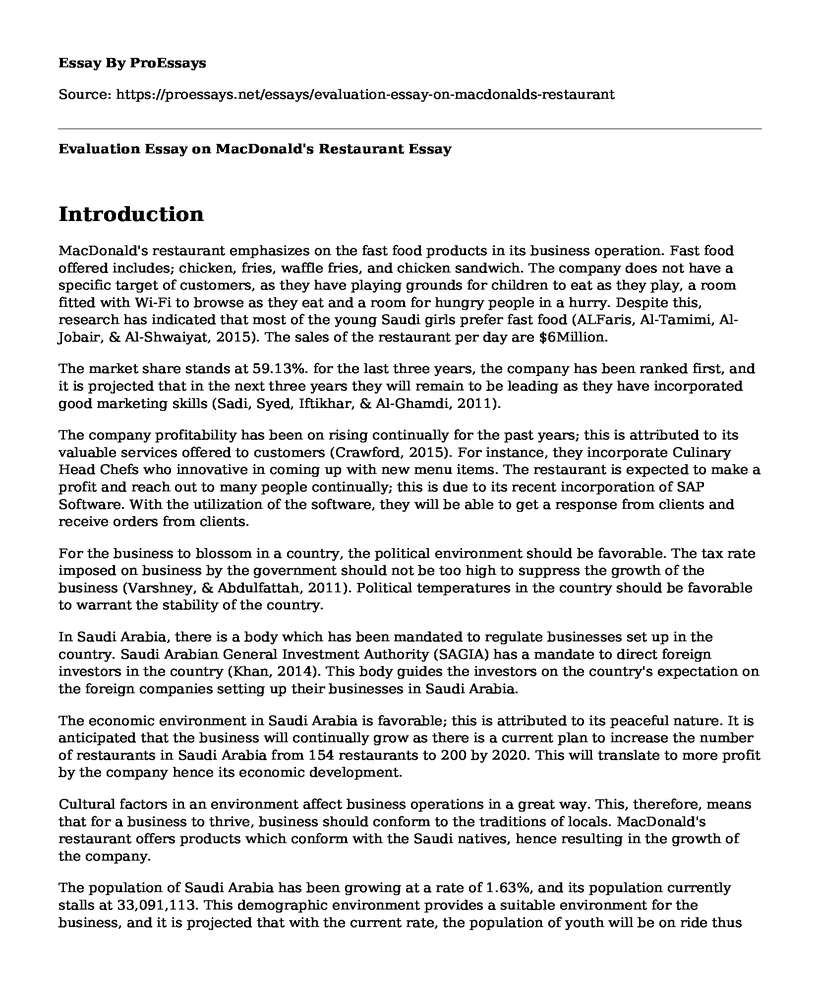Introduction
MacDonald's restaurant emphasizes on the fast food products in its business operation. Fast food offered includes; chicken, fries, waffle fries, and chicken sandwich. The company does not have a specific target of customers, as they have playing grounds for children to eat as they play, a room fitted with Wi-Fi to browse as they eat and a room for hungry people in a hurry. Despite this, research has indicated that most of the young Saudi girls prefer fast food (ALFaris, Al-Tamimi, Al-Jobair, & Al-Shwaiyat, 2015). The sales of the restaurant per day are $6Million.
The market share stands at 59.13%. for the last three years, the company has been ranked first, and it is projected that in the next three years they will remain to be leading as they have incorporated good marketing skills (Sadi, Syed, Iftikhar, & Al-Ghamdi, 2011).
The company profitability has been on rising continually for the past years; this is attributed to its valuable services offered to customers (Crawford, 2015). For instance, they incorporate Culinary Head Chefs who innovative in coming up with new menu items. The restaurant is expected to make a profit and reach out to many people continually; this is due to its recent incorporation of SAP Software. With the utilization of the software, they will be able to get a response from clients and receive orders from clients.
For the business to blossom in a country, the political environment should be favorable. The tax rate imposed on business by the government should not be too high to suppress the growth of the business (Varshney, & Abdulfattah, 2011). Political temperatures in the country should be favorable to warrant the stability of the country.
In Saudi Arabia, there is a body which has been mandated to regulate businesses set up in the country. Saudi Arabian General Investment Authority (SAGIA) has a mandate to direct foreign investors in the country (Khan, 2014). This body guides the investors on the country's expectation on the foreign companies setting up their businesses in Saudi Arabia.
The economic environment in Saudi Arabia is favorable; this is attributed to its peaceful nature. It is anticipated that the business will continually grow as there is a current plan to increase the number of restaurants in Saudi Arabia from 154 restaurants to 200 by 2020. This will translate to more profit by the company hence its economic development.
Cultural factors in an environment affect business operations in a great way. This, therefore, means that for a business to thrive, business should conform to the traditions of locals. MacDonald's restaurant offers products which conform with the Saudi natives, hence resulting in the growth of the company.
The population of Saudi Arabia has been growing at a rate of 1.63%, and its population currently stalls at 33,091,113. This demographic environment provides a suitable environment for the business, and it is projected that with the current rate, the population of youth will be on ride thus creating a market for the MacDonald's restaurants products.
Adoption of the new trends in technology will enhance the growth of the business. Recently MacDonald's company incorporated SAP software and social media as a way of appreciating technology and using it to expand the territories of its business operation (Al Saud, & Khan, 2013).
The climatic condition in Saudi Arabia has a negative impact on the business. The country experiences high temperatures which makes it uncomfortable environment under natural circumstances. This has made MacDonald's restaurants to invest heavily on the air conditioning appliances to create a conducive environment for its customers.
The infrastructure of the country meets the required standards; this has made it possible for the customers of the restaurant to be able to access the facility with ease at any time.
References
Varshney, D., & Abdulfattah, F. H. (2011) Applying select Strategic Management concepts on a Saudi Arabian start-up restaurant: A case.
Crawford, A. (2015). McDonald's: A Case Study in Glocalization. Journal of Global Business Issues, 9(1), 11.
ALFaris, N. A., Al-Tamimi, J. Z., Al-Jobair, M. O., & Al-Shwaiyat, N. M. (2015). Trends of fast food consumption among adolescent and young adult Saudi girls living in Riyadh. Food & Nutrition Research, 59(1), 26488.
Al Saud, A. A., & Khan, M. R. (2013). Role of social media in brand development in Saudi Arabia. European Journal of Business and Economics, 8(1).
Sadi, M. A., Syed, K. J., Iftikhar, Q., & Al-Ghamdi, M. S. (2011). Customers perception of International Franchising and Its Impact On a Growing Market: The Case of Saudi Arabia. Issn 1931-0285 Cd Issn 1941-9589 Online, 707.
Khan, M. A. (2014). Restaurant franchising: Concepts, regulations, and practices. Apple Academic Press.
Cite this page
Evaluation Essay on MacDonald's Restaurant . (2022, Dec 18). Retrieved from https://proessays.net/essays/evaluation-essay-on-macdonalds-restaurant
If you are the original author of this essay and no longer wish to have it published on the ProEssays website, please click below to request its removal:
- Expansion of a Business
- Genki Sushi Shop Globalization Paper Example
- Essay Sample on Business and Entrepreneurship
- Entrepreneurship Overview: Intention & Beyond - Essay Sample
- Essay Sample on Navigating Ethical Dilemmas in Global Business: Finding Common Ground
- Global Companies: Tapping Into the Global Marketplace With Expert Assistance - Essay Sample
- Crisis Management Planning Case Study of Holiway Garden Resort & Spa in Bali and the Volcano Agung







